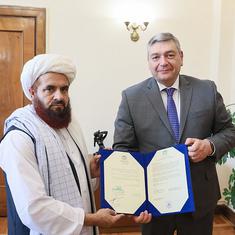“I can talk about music all day,” Pyarelal Ramprasad Sharma, better known to the world by his first name Pyarelal, fondly declared over the phone from his house in Mumbai.
Indeed, and how. Here’s what one half of the legendary composing duo Laxmikant-Pyarelal told Scroll.in about the widely held belief that the golden era of Hindi film music has long passed: “Music is never bad. If you say today’s music is bad, your thinking is wrong. You may not like a certain style of music. That’s alright. But music is beautiful, like our relationships. Sometimes, some friends may fail us, or you may not be happy with your parents. But that doesn’t mean the relationships themselves are bad.”
The 79-year-old composer, along with the late Laxmikant Shantaram Kudalkar, created soundtracks for over 600 Hindi films. In a career spanning nearly four decades, Laxmikant-Pyarelal produced some of the most acclaimed and successful Hindi film albums: Dosti (1964), Milan (1967), Do Raaste (1969), Bobby (1973), Amar Akbar Anthony (1977), Karz (1980), Prem Rog (1982), Hero (1983), Utsav (1984), Tezaab (1988), Ram Lakhan (1989), and Khalnayak (1993).
Away from active composing duties since Laxmikant’s death in 1998, Pyarelal has sporadically worked as a music arranger. The credit for the lush orchestral sound of Vishal-Shekhar’s Dhoom Taana (Om Shanti Om, 2007), which doffs a hat to the evolving sounds and styles of Hindi film music, goes to Pyarelal.
Pyarelal is among the highlights of MX Player’s new show Times of Music, in which composers from different generations and following different styles reinterpret each other’s music in front of a live audience. In the episode dated June 20, Pyarelal was paired-with Salim Sulaiman. While Salim-Sulaiman reworked Mere Mehboob Qayamat Hogi (Mr X in Bombay, 1964), Pyarelal took on Shukran Allah (Kurbaan, 2009).
This collaboration was perhaps waiting to happen. Salim-Sulaiman revealed how Laxmikant-Pyarelal’s hook on Jumma Chumma De De (Hum, 1991) inspired the stadium-friendly chorus of the Chak De India (2007) title track.
Their spin on Mere Mehboob Qayamat Hogi was a smooth and funky affair, with baroque touches such as a violin solo, which was a tribute to Pyarelal. Meanwhile, Pyarelal brought his typical flourish to Salim-Sulaiman’s ballad with a stacked orchestra, prominent tabla and dholaks, and plenty of melodic changes in the interludes.
“We always wondered how our songs would sound if done differently,” Pyarelal said. “But we had to work within the constraints of what a film required. This time, we were given the freedom. On listening to what I have done, you will realise I haven’t disturbed the melody. I ensured that I didn’t put in elements that came in way of the tune. I only played with the rhythm section and the musical style.”
Laxmikant-Pyarelal’s soundtracks had an unbelievable range, spread across many genres, moods, styles and situations.
For the soft and pleasant ballads of Dosti or Milan, there was the cheer and bombast of Amar Akbar Anthony and Karz. Their technical command over their music, despite the difference in the sound of their work in the 1960s, such as Aaye Din Bahar Ke (1966), and their successes in the ’90s, such as Khalnayak, is stunning.
A constant was the duo’s complex, often polyrhythmic arrangements, and their seemingly calculated distance from the synthesiser and assorted electronics, which became an area in which Laxmikant-Pyarelal’s contemporaries Kalyan-Anandji specialised.
Pyarelal clarified his stance on electronic music: “I like everything. What I feel sad about is that, while a keyboard offers sounds of all kinds of instruments, many performers don’t play it correctly. You cannot play a trumpet like it’s a flute. You cannot play the violin like it’s an oboe. Use the right technique for the right instrument.”
Laxmikant-Pyarelal, Kalyanji-Anandji and RD Burman dominated the popular Hindi film music scene in the late ’60s through the ’70s and afterwards, despite the meteoric rise of Bappi Lahiri in the ’80s. Pyarelal recalled how he was friends with Kalyanji-Anandji and the young Burman despite nurturing a healthy rivalry.
“We were all friends and did work together,” Pyarelal said. “I arranged music for nearly all composers, including Kalyanji-Anandji and Pancham [Burman], for whom we worked on his early films like Chhote Nawab and Bhoot Bungla. Pancham sometimes did session work for us. We all had a part in each other’s music. Music is collaborative. The moment I, me, myself comes into it, your work is ruined.”
Among Laxmikant-Pyarelal’s most regular collaborators was lyricist Anand Bakshi, who worked with the duo in over an estimated 300 films or more. Pyarelal generously quoted from Bakshi’s lyrics from their songs while making one point or the other.
“I began learning music in 1948, and began working from 1952,” the 1940-born Pyarelal said. “This is my 68th year as a professional musician. Like the Haathi Mere Saathi song goes, duniya mein rehna hai to kaam karo pyaare. Haath jod sab ko, salaam karo pyaare.” If you have to survive in the world, keep working. Be humble and greet everyone.
The only regret Pyarelal has about his career is never finding an opportunity to work with OP Nayyar, and his favourite composers, Shankar-Jaikishan, though he recalled them coming to his wedding.
Pyarelal had high praise for contemporary musicians in the Hindi film industry. “Arijit Singh is undoubtedly a good singer,” he said. “So is Sonu Nigam, Sunidhi Chauhan. Shreya Ghoshal is just great. What I like about them are that they are carrying the old traditions with them but they also know how to innovate, so they can take music forward.”
For Pyarelal, composing songs for fillms is the loveliest job in the world. “I got to work with the best of the best, from Lata ji to Rafi saab,” he said. “And when you make a tune, so many talented people bring it to life, from musicians to singers to actors to directors to cameraman. And then the public directly responds to your work once it’s out. I am quite lucky to have had this job.”










